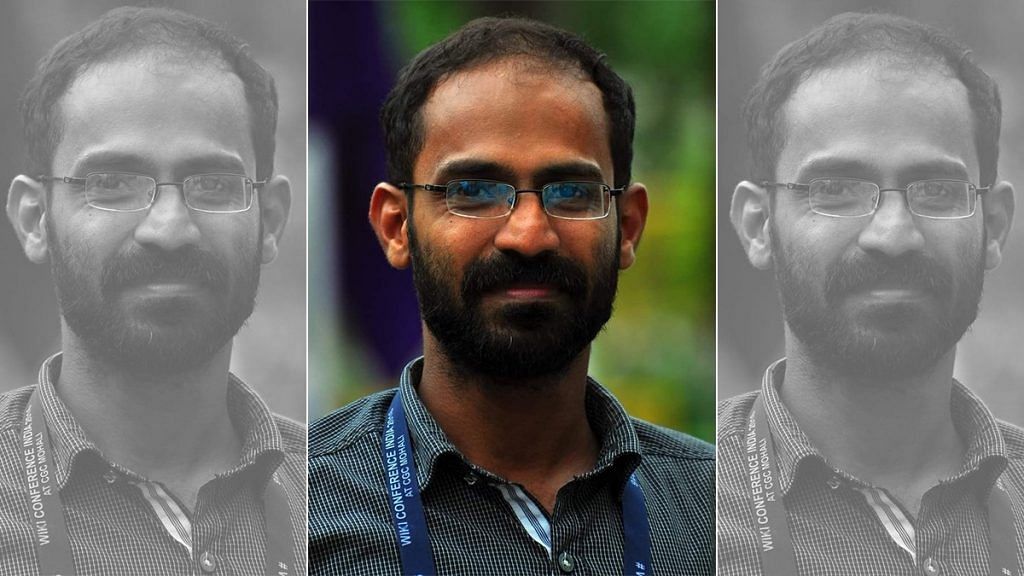New Delhi: The Supreme Court on Friday granted bail to jailed journalist Siddique Kappan, who was arrested on 5 October, 2020 while on his way to Hathras to report on the gangrape and murder of a 19-year-old Dalit girl.
The Uttar Pradesh Police booked the scribe under the stringent Unlawful Activities Prevention Act (UAPA) and other charges, claiming Kappan conspired to incite communal riots in the area in the aftermath of the alleged crime.
A three-judge bench, led by Chief Justice U.U. Lalit set aside the Allahabad High Court’s 2 August order that declined relief to Kappan. The bench granted him bail in view of the length of his custody, which is two years, and the fact that the trial court was yet to frame charges in the case, even though the police’s chargesheet was filed in April last year.
Although the justices posed several questions on various aspects of the investigation and the evidence gathered in the case, the court did not make it a part of its order, with the judges noting they would not like to go into the merits of the allegations at this stage.
“Every person has a right to free expression. He is trying to show that victims need justice and (should) raise a common voice. Will this be a crime in the eyes of law,” the bench asked Mahesh Jethmalani, who represented Uttar Pradesh. Jethmalani said Kappan had gone to Hathras with the motive of creating a rift between two communities.
Jethmalani was rebuffed by the court when he claimed that Kappan’s visit to Hathras was aimed at organising protests.
“There were protests at India Gate… after that there was a change in the law. Sometimes protests are necessary to highlight deficiency somewhere,” the bench said, reminding Jethmalani of the large-scale protests that erupted following the Nirbhaya gangrape.
The bench, also comprising justices Ravindra Bhat and P.S. Narasimha, further made oral observations on the nature of evidence gathered in the case against Kappan, which, according to it, was not “provocative”.
Opposing bail to Kappan, Jethmalani argued that he was affiliated to “terrorist organisation Popular Front of India (PFI)”, which had given him the task to drum up propaganda around the alleged crime so that it could lead to a conflict between the two communities, ending in riots.
Jethmalani alleged Kappan was found in possession of a “toolkit”, including pamphlets, for causing unrest in the area and said there was evidence to show he received funds – Rs 45,000 – for the job entrusted to him. In September 2020, Kappan also participated in a meeting called by the PFI to discuss how the organisation could incite riots in sensitive areas, Jethmalani argued trying to project Kappan as an active PFI associate.
When told his co-accused in their statement had confirmed his affiliation with the PFI, CJI Lalit noted: “These statements cannot be read against him.”
Jethmalani then informed the court that the police were in the process of finalising an approver, which would take two months to complete. This made the court observe: “Your attempt to turn someone approver is still going (on) which means the matter is not ripe for framing of charges.”
However, the court did not go into the merits of the allegations and noted the trial court had not yet taken into consideration whether charges needed to be framed or not.
“At this stage, we refrain from dealing with and commenting upon the progress of investigation and material gathered by the prosecution in support of its case as the matter is still to be taken up for framing of charge,” the court order stated.
Considering the length of the custody undergone by the appellant and other facts and circumstances of the case, the court directed the Mathura jail authorities to produce Kappan before the concerned trial court within three days. The justices said he should be released on bail subject to conditions that ensured his presence and participation in the case.
Kappan is the second accused to get relief in the case. Earlier, the Allahabad High Court gave bail to co-accused Mohammad Alam, who was the driver of the car in which Kappan was travelling at the time of his arrest.
The apex court has also ordered Kappan to be in Delhi and within the jurisdiction of the Nizamuddin police station, the area where he stays. He will not leave the city without the permission of the trial court where the case against him was pending, the top court said.
He shall report to the concerned police station every Monday and his presence would be marked in a register, the court added. This condition, the court specified, should be applicable for six weeks from the date of Kappan’s release.
After that, he would be allowed to go back to native Kerala where he shall, in a similar fashion, report to the local police station every Monday to mark his presence, the court said.
Kappan was further directed to ensure that he, through his advocate or in person, attended proceedings before the trial court on every single date. He shall deposit his passport if not done so far, the court ordered.
One of the conditions for bail imposed a prohibition on Kappan from getting in touch with any person associated with the controversy in question.
Since Kappan is also facing a Prevention of Money Laundering (PMLA) case, the court said the bail conditions may be relaxed when he is required to initiate an application for bail in this particular matter.
Also read: UP govt opposes Siddique Kappan’s bail plea, tells SC he has ‘deep links’ with terror outfits
